现代大学英语精读1 Unit 10 Mandela’s Garden
- 格式:ppt
- 大小:919.50 KB
- 文档页数:27
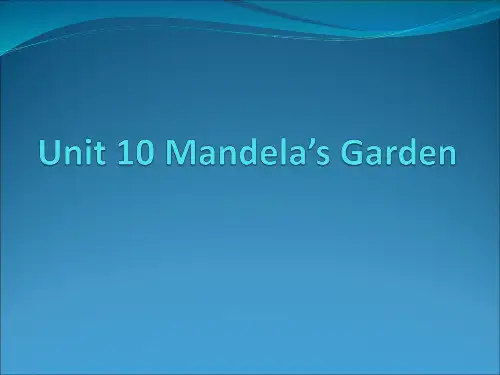
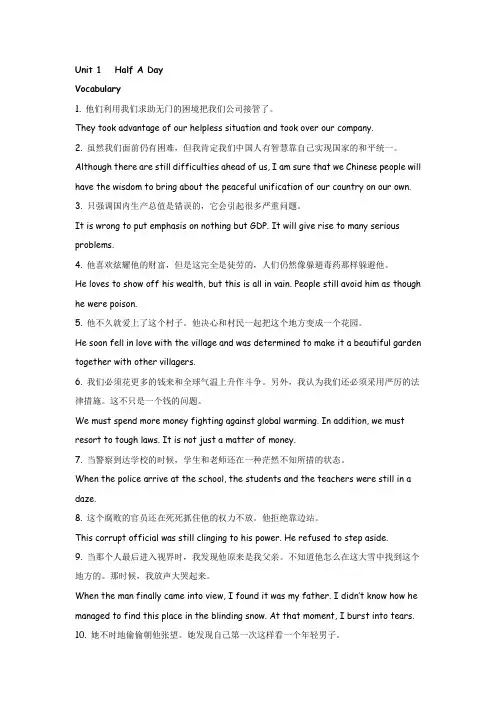
Unit 1 Half A DayVocabulary1. 他们利用我们求助无门的困境把我们公司接管了。
They took advantage of our helpless situation and took over our company.2. 虽然我们面前仍有困难,但我肯定我们中国人有智慧靠自己实现国家的和平统一。
Although there are still difficulties ahead of us, I am sure that we Chinese people will have the wisdom to bring about the peaceful unification of our country on our own.3. 只强调国内生产总值是错误的,它会引起很多严重问题。
It is wrong to put emphasis on nothing but GDP. It will give rise to many serious problems.4. 他喜欢炫耀他的财富,但是这完全是徒劳的,人们仍然像躲避毒药那样躲避他。
He loves to show off his wealth, but this is all in vain. People still avoid him as though he were poison.5. 他不久就爱上了这个村子。
他决心和村民一起把这个地方变成一个花园。
He soon fell in love with the village and was determined to make it a beautiful garden together with other villagers.6. 我们必须花更多的钱来和全球气温上升作斗争。
另外,我认为我们还必须采用严厉的法律措施。
这不只是一个钱的问题。
We must spend more money fighting against global warming. In addition, we must resort to tough laws. It is not just a matter of money.7. 当警察到达学校的时候,学生和老师还在一种茫然不知所措的状态。
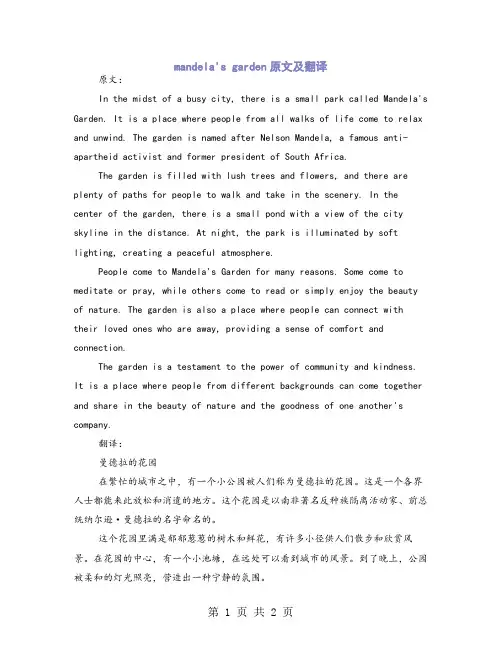
mandela's garden原文及翻译原文:In the midst of a busy city, there is a small park called Mandela's Garden. It is a place where people from all walks of life come to relax and unwind. The garden is named after Nelson Mandela, a famous anti-apartheid activist and former president of South Africa.The garden is filled with lush trees and flowers, and there are plenty of paths for people to walk and take in the scenery. In the center of the garden, there is a small pond with a view of the city skyline in the distance. At night, the park is illuminated by soft lighting, creating a peaceful atmosphere.People come to Mandela's Garden for many reasons. Some come to meditate or pray, while others come to read or simply enjoy the beauty of nature. The garden is also a place where people can connect withtheir loved ones who are away, providing a sense of comfort and connection.The garden is a testament to the power of community and kindness. It is a place where people from different backgrounds can come together and share in the beauty of nature and the goodness of one another's company.翻译:曼德拉的花园在繁忙的城市之中,有一个小公园被人们称为曼德拉的花园。
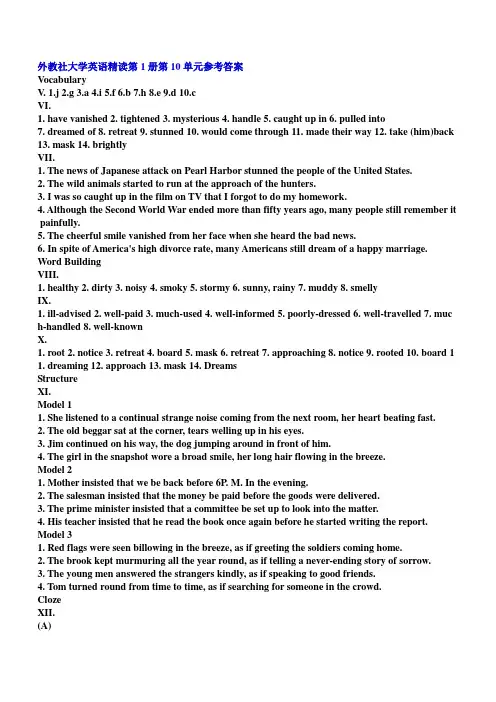
外教社大学英语精读第1册第10单元参考答案VocabularyV. 1.j 2.g 3.a 4.i 5.f 6.b 7.h 8.e 9.d 10.cVI.1. have vanished2. tightened3. mysterious4. handle5. caught up in6. pulled into7. dreamed of 8. retreat 9. stunned 10. would come through 11. made their way 12. take (him)back 13. mask 14. brightlyVII.1. The news of Japanese attack on Pearl Harbor stunned the people of the United States.2. The wild animals started to run at the approach of the hunters.3. I was so caught up in the film on TV that I forgot to do my homework.4. Although the Second World War ended more than fifty years ago, many people still remember it painfully.5. The cheerful smile vanished from her face when she heard the bad news.6. In spite of America's high divorce rate, many Americans still dream of a happy marriage. Word BuildingVIII.1. healthy2. dirty3. noisy4. smoky5. stormy6. sunny, rainy7. muddy8. smellyIX.1. ill-advised2. well-paid3. much-used4. well-informed5. poorly-dressed6. well-travelled7. muc h-handled8. well-knownX.1. root2. notice3. retreat4. board5. mask6. retreat7. approaching8. notice9. rooted 10. board 1 1. dreaming 12. approach 13. mask 14. DreamsStructureXI.Model 11. She listened to a continual strange noise coming from the next room, her heart beating fast.2. The old beggar sat at the corner, tears welling up in his eyes.3. Jim continued on his way, the dog jumping around in front of him.4. The girl in the snapshot wore a broad smile, her long hair flowing in the breeze.Model 21. Mother insisted that we be back before 6P. M. In the evening.2. The salesman insisted that the money be paid before the goods were delivered.3. The prime minister insisted that a committee be set up to look into the matter.4. His teacher insisted that he read the book once again before he started writing the report. Model 31. Red flags were seen billowing in the breeze, as if greeting the soldiers coming home.2. The brook kept murmuring all the year round, as if telling a never-ending story of sorrow.3. The young men answered the strangers kindly, as if speaking to good friends.4. Tom turned round from time to time, as if searching for someone in the crowd.ClozeXII.(A)(1)mysterious (2)caught up in (3)dusty (4)made her way (5)painfully (6)approached (7)take him ba ck (8)vanish (9)pulled into (10)exclaimed(B)(1)least (2)feel (3)at (4)for (5)unless (6)with (7)anywhere (8)happened (9)its (10)the(11) better (12)anything (13)in (14)one (15)said (16)about (17)over (18)name (19)which (20)offered(21) who (22)frightened (23)take (24)by (25)dead (26)cut (27)else (28)sleeping (29)following (30)had (31)on (32)ifTranslationXIII.1. We were caught up in a discussion about the situation in the Middle East when the professor wa lked into the classroom.2. A truck pulled into the snow-covered playground of the school.3. Sometime after midnight, the enemy was /were forced to retreat.4. It was in that small room that they worked diligently and dreamed of better days to come.5. When she heard the bell ringing, the old lady rose from her chair and made her way to the door.6. After a day's fight, our soldiers succeeded in taking over some important enemy positions.7. The elderly woman angrily exclaimed that she had been cheated by the shop girl.8. Soon after I boarded the bus, I noticed a strange-looking man. He wore an ill-fitting coat, and sat rooted in his seat.Key to Reading PracticeExercise A1.d2.d3.d4.a.John began to sweat.b. He felt like having a cigarette although he had quit smoking three ninths before.c. His hands were shaking.d. He apologized nervously.5. d6. the son of an oil millionaireExercise B1. 为了在半夜之前赶到家,他把参观公司新总部的事儿也往后推迟了,而此刻他却难以保持清醒。
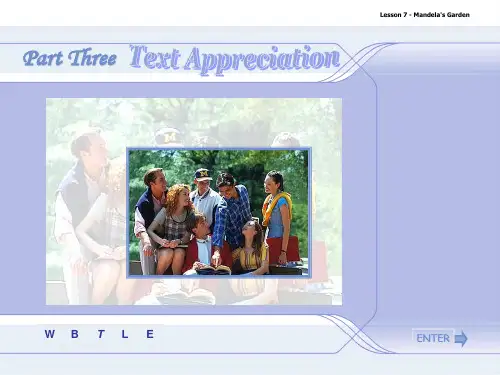
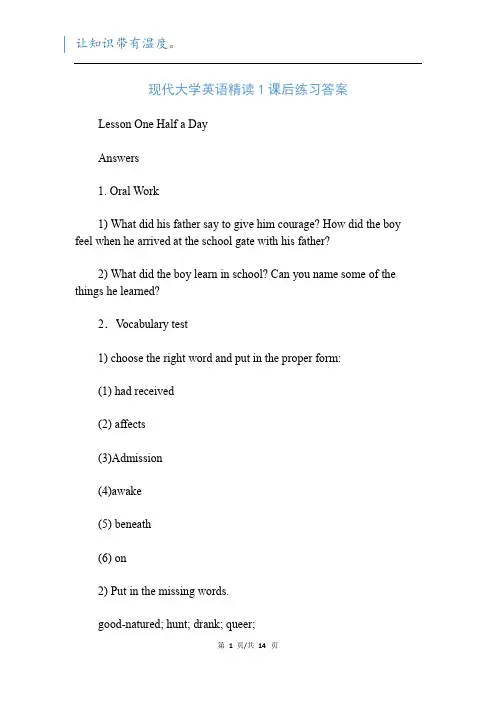
现代大学英语精读1课后练习答案Lesson One Half a DayAnswers1. Oral Work1) What did his father say to give him courage? How did the boy feel when he arrived at the school gate with his father?2) What did the boy learn in school? Can you name some of the things he learned?2.V ocabulary test1) choose the right word and put in the proper form:(1) had received(2) affects(3)Admission(4)awake(5) beneath(6) on2) Put in the missing words.good-natured; hunt; drank; queer;asleep; woke; occurred; absence;portrait; replace.3.Grammar WorkPut in the blanks with correct verb forms.(1) was surfing; was cut;(2) will have planted;(3) was; had not been;(4) has been married;(5) is; will be;(6) is; must have rained4.Written WorkWrite what you’ve learnt from the text about the little boy’s life in school in about 100 words.5.Translation(1)大概全部教导最有价值的结果就是培养你有具有让你完成你不得不做的任何该做的事,不管你愿不肯意做.(2)教导就是能让我们不断地发觉我们的无知.Lesson Two Going HomeAnswers1. Oral work(1) What do you know about these young people?(2) How did the young people feel when they heard the story ?2. V ocabulary test1) choose the right word and put in the proper form:(1) across(2) rise(3) attend/ take part in(4) reach(5) since(6) above/ below2) Put in the missing words.screaming; clenched; triumph; exaltation; except; stunned; misty; covered; ribbons; banner3.Grammar workTranslation.(1) Nobody could tell where the treasure was hidden.(2) The traffic will be very heavy on the road during the rush hour everyday.(3) He may have given her advice, but I doubt if it does her any good.(4) What she learned at university proved useful in her research .(5) If he had waited for the traffic lights to change, he would not have been killed.(6) If not I had seen him at the party yesterday evening !4. Written Work略.5. Translation(1)多给人原谅比多去责备(2)假如我们想要去爱,我们必需学会如何去原谅.Lesson Three Massage of the LandAnswers1. Oral work (answers omitted)2. V ocabulary test1)(1) unfaithful (2) take out(3) talk over (4) send for(5) sent away (6) send up2) Put the missing words(1) sick / ill (2) alone (3) out (4) phone (5) on(6) until (7) church (8) only (9) answered (10) needed (11) clever (12) save (13) bit (14) now3) Write the numbers in words.(1) Two hundred and eight(2) One thousand five hundred / fifteen hundred(3) Seven thousand, one hundred and twenty-eight.(4) two dollars six-five / two dollars and sixty-five cents.(5) fourth(6) twenty-first(7) thirtieth(8) one half, three quarters, four fifths3.Grammar work (answers omitted)4. Written WorkOne possible version:My parents were born, brought up and married on this land. They have been living there through their life. They got up at sunrise and retired with their chickens. They planted and reaped rice and raised a few goats, cows and chickens which could provide what they needed in their daily life.. However, the piece of lands was no longer fertile, bleeding year after year, like them, getting old and exhausted. The soil was not difficult to till when there was a lot of rain, but in a bad year, it was not only the ploughs that broke but their hearts, too. The farmer life is hard but my parents are enjoying it. They cherish their land and never want to leave it.5. Translation.1) 家再贫寒,也没有任何地方能和它比。
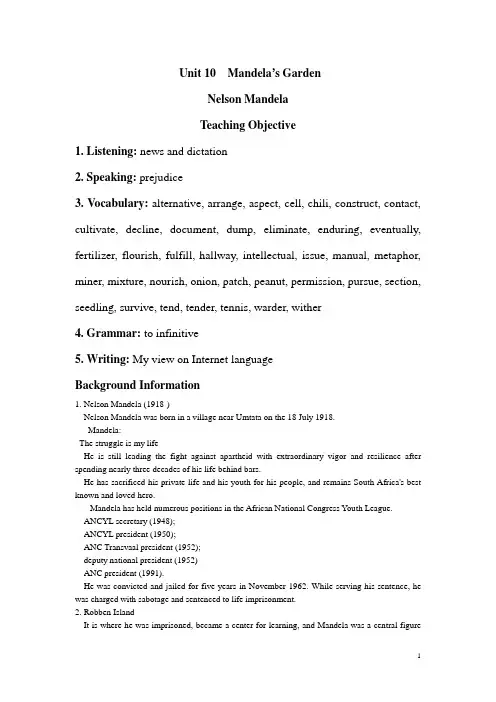
Unit 10 Mandela’s GardenNelson MandelaTeaching Objective1. Listening: news and dictation2. Speaking: prejudice3. Vocabulary: alternative, arrange, aspect, cell, chili, construct, contact, cultivate, decline, document, dump, eliminate, enduring, eventually, fertilizer, flourish, fulfill, hallway, intellectual, issue, manual, metaphor, miner, mixture, nourish, onion, patch, peanut, permission, pursue, section, seedling, survive, tend, tender, tennis, warder, wither4. Grammar: to infinitive5. Writing: My view on Internet languageBackground Information1. Nelson Mandela (1918-)Nelson Mandela was born in a village near Umtata on the 18 July 1918.Mandela:The struggle is my lifeHe is still leading the fight against apartheid with extraordinary vigor and resilience after spending nearly three decades of his life behind bars.He has sacrificed his private life and his youth for his people, and remains South Africa's best known and loved hero.Mandela has held numerous positions in the African National Congress Youth League. ANCYL secretary (1948);ANCYL president (1950);ANC Transvaal president (1952);deputy national president (1952)ANC president (1991).He was convicted and jailed for five years in November 1962. While serving his sentence, he was charged with sabotage and sentenced to life imprisonment.2. Robben IslandIt is where he was imprisoned, became a center for learning, and Mandela was a central figurein the organized political education classes.In prison Mandela never compromised his political principles and wasalways a source of strength for the other prisoners.Nelson Mandela was released on February 18, 1990. After his release, he plunged himself wholeheartedly into his life's work, striving to attain the goals he and others had set out almost four decades earlier.3. Apartheidn. (in South Africa) official government policy of racial segregation, separating Europeans and non-Europeans种族隔离4. Ethnocentrism: n.1)Belief in the superiority of one's own ethnic group.2) Overriding concern with race.5. Genocide: n.The systematic and planned extermination of an entire national, racial, political, or ethnic group.6. ThemeFor Mandela, gardening is the source of spiritual fulfillment. Gardening gives Mandela inspiration for his revolutionary cause. Political leaders are like gardeners.ⅡWarm-up activities1. Do you know anything about gardening?2. Describe a scene living in a garden city.ⅢDetailed study of the textPara 11. In early 1977, the authorities announced the end of manual labor and arranged work for us to do in the courtyard, so we could spend our days in our section.the authorities---the people or organizations in charge. Here it refers to the prison authorities. 2. announce the end of manual labor---In the past, Mandela and other political prisoners locked up on Robben Island were to work in a quarry cutting stones, which was very hard manual labor.3. section---the part of prison where Mandela and other political prisoners were kept.4. liberatingThis arrangement not only freed the prisoners from hard manual labor, but also saved them long trips to and from the quarry so that they now had time and energy for things they were unable to do in the past.5. preparing legal documents---This shows that Mandela did not ask for a lawyer. He had decided to be his own lawyer.6. pursue---to continue trying to do or achieve sth over a long period of timen. pursuitPara 27. get satisfaction from/find satisfaction in/take satisfaction in or from sth8. develop---create sth over a period of time9. feel fulfilled---feel happy and satisfied because you are doing useful or important things10. empty of dust---completely without dust11. take pride in---be proud ofPara 311. give in to---finally agree to what sb wants, after refusing for a period of timePara 412. garbage dump---a place where garbage is taken and left13. I had to remove a great many rocks to allow the plants room to grow.remove---take away from a placea great many/number ofa great deal/amount of14. room---space15. allow sb to do sthI have to take away a large number of rocks so that the plants have space to grow.16. at heart---basically, fundamentallyPara 517. hardy plants---plants who can survive in the extremely serious conditionsQ: What do hardy plants imply?The political prisoners are strong to keep surviving18. regret to do---regret doingforget, remember to do/doing19. flourish---grow well and be healthy20. provide sb with sth---provide sth for sbPara 621. While I have always enjoyed gardening, it was not until I was behind bars that I was able to tend my own garden.while---althoughbe behind bars---be in prisontend---look after sth/sbAlthough I have always loved gardening, I didn’t have a garden of my own until I was in prison.22. contact withtouch, get in touch with23. alternative---choice24. neither… norPara 725. through trial and error---a way of achieving an aim or solving a problem by trying a number of different methods and learning from the mistakes that you madePara 826. enduring satisfaction---satisfaction that lasts for a very long time27. This sense of being the owner of the small patch of earth offered a small taste of freedom.sense---a particular feeling about sthBeing aware that you could grow whatever you wanted on a small piece of land enabled you to enjoy a small amount of freedom.Para 928. In some ways, I saw the garden as a metaphor for certain aspects of my life.see sth/sb as---see sth/sb in a particular way; regard sth asmetaphor, simile, personification, hyperbole/exaggeration, repetitioncertain aspects of my life---a national leader, the handling of human relationship in general, and of his marriage with Winnie in particularPara 1029. Leaders must also look after their gardens; they, too, plant seeds, and then watch, cultivate, and harvest the results.Mandela is here comparing his gardening with his responsibility as a national leader. As in gardening, in his struggle as an ANC leader, he also has to plant seeds, and take care of what he has planted until in the end he harvests the results.Q: What do “garden”, “plant seeds”, “watch”, “watch”, “cultivate”, “harvest the result” symbolize/represent respectively?30. mind one’s work---take care of sth/sb; watch or be in charge of sth/sbPara 1131. When it finally died, I removed the roots from the soil, washed them, and buried them in a corner of the garden.By telling Winnie what he did with the dead tomato plant in detail, Mandela wanted her to know he cared about their marriage and felt very sorry about their worsening relationship.32. wither---fade33. either through some mistake or lack of care, the plant began to wither and decline, and nothingI did would bring it back to health.Mandela seemed to feel that he was partly responsible for the way his relationship with his wife had declined, and that was why he did what he could to save their marriage. But he felt that their marriage probably wouldn’t survive.Para 1134. at length---for a long time, in a full and complete way, in detail35. I do not know what she read into that letterread into sth---think that an action, remark or situation has a particular importance of meaning, often when this is not true.I do not know how she understood that letter.36. Sometimes there is nothing one can do to save something that must die.If sth which is unavoidable/inevitable, you have to accept it.ⅣStructure analysisPart One: (paras.1-8) describes his gardening experience. It shows how Mandela takes this hobby as a survival strategy. The gardening gives him satisfaction, offers a taste of freedom, and makes him strong physically and mentally.Part Two: (paras.9-11) goes further to explain the significance of his gardening experience, which has become a metaphor and gives him inspirationship (specifically with his wife).ⅤExercises。
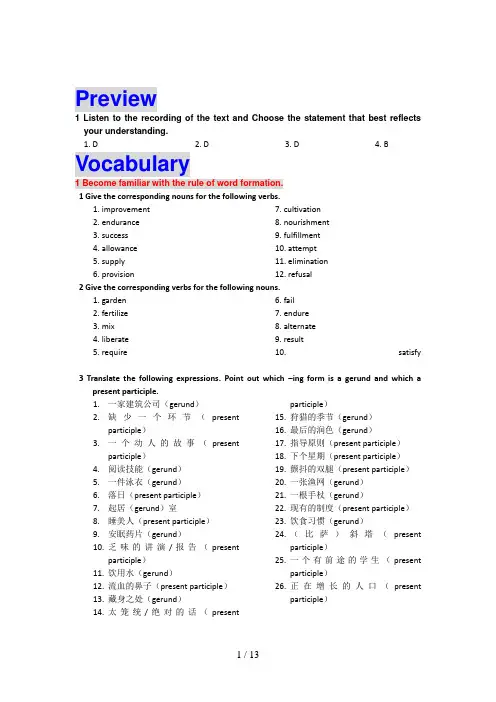
Preview1 Listen to the recording of the text and Choose the statement that best reflects your understanding.1. D2. D3. D4. B Vocabulary1 Become familiar with the rule of word formation.1 Give the corresponding nouns for the following verbs.1. improvement2. endurance3. success4. allowance5. supply6. provision7. cultivation8. nourishment9. fulfillment10. attempt11. elimination12. refusal2 Give the corresponding verbs for the following nouns.1. garden2. fertilize3. mix4. liberate5. require6. fail7. endure8. alternate9. result10. satisfy3 Translate the following expressions. Point out which –ing form is a gerund and which apresent participle.1.一家建筑公司(gerund)2.缺少一个环节(presentparticiple)3.一个动人的故事(presentparticiple)4.阅读技能(gerund)5.一件泳衣(gerund)6.落日(present participle)7.起居(gerund)室8.睡美人(present participle)9.安眠药片(gerund)10.乏味的讲演/报告(presentparticiple)11.饮用水(gerund)12.流血的鼻子(present participle)13.藏身之处(gerund)14.太笼统/绝对的话(presentparticiple)15.狩猎的季节(gerund)16.最后的润色(gerund)17.指导原则(present participle)18.下个星期(present participle)19.颤抖的双腿(present participle)20.一张渔网(gerund)21.一根手杖(gerund)22.现有的制度(present participle)23.饮食习惯(gerund)24.(比萨)斜塔(presentparticiple)25.一个有前途的学生(presentparticiple)26.正在增长的人口(presentparticiple)4 Compare the following expressions and translate them into Chinese.1.发展中国家;发达国家2.正在落下的树叶;落下的树叶3.正在沸腾的水;开水4.正在退败的战斗;一场败仗2 Complete thefollowing verb +collocations orexpressions.1.have/get/show/produce/achieve2.have/take/accept/show/bear/assume3.discuss/debate/raise/settle/confuse/avoid4.pursue/have/develop5.have/make/lose/avoid6.face/lives/time/money/trouble7.roots/chairs/hats/coats/gloves/shoes/bandages/make-up/doubts8. land9.enemies/rivals/opponents/suspects/errors10.oil/cars/cotton/results/a movie11.care/time/money/experience/patience/courage12. thedead/treasure/past/head13.plants/children/animals/relationship 14.meetings/appointments/time/place/books/flowers/business affairs3 Fill in the blanks with the correct form of the expressions listed below.1. cut out, removed/cut out, from2. provides/supplies, with3. brought back4. ask, permission5. empty6. take, in, through trial and error7. read, into8. at great length, providing, with9. in some ways, at heart4 Fill in the blanks with the correct prepositions or adverbs.1. in2. up3. away4. way5. out6. up7. out8. up9. with5 Translate the following sentences into English.1. 如果他们拒绝归还这些小岛,他们两国的关系就不能完全正常化。
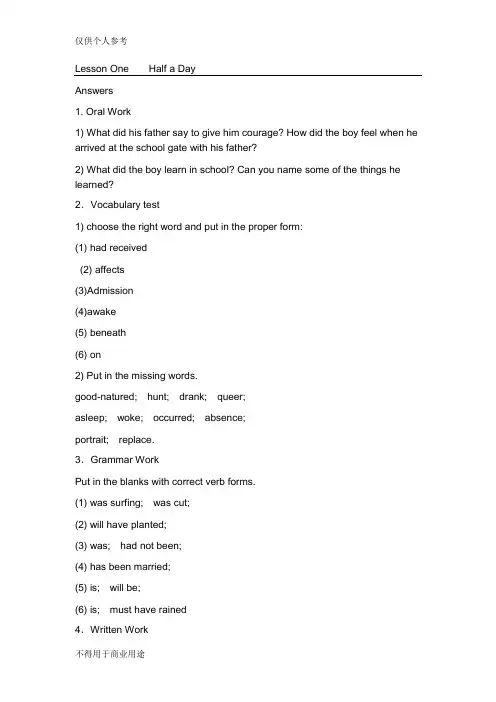
Lesson One Half a DayAnswers1. Oral Work1) What did his father say to give him courage? How did the boy feel when he arrived at the school gate with his father?2) What did the boy learn in school? Can you name some of the things he learned?2.Vocabulary test1) choose the right word and put in the proper form:(1) had received(2) affects(3)Admission(4)awake(5) beneath(6) on2) Put in the missing words.good-natured; hunt; drank; queer;asleep; woke; occurred; absence;portrait; replace.3.Grammar WorkPut in the blanks with correct verb forms.(1) was surfing; was cut;(2) will have planted;(3) was; had not been;(4) has been married;(5) is; will be;(6) is; must have rained4.Written WorkWrite what you’ve learnt from the text about the little boy’s life in school in about 100 words.5.Translation(1)也许所有教育最有价值的结果就是培养你有具有让你完成你不得不做的任何该做的事,不管你愿不愿意做.(2)教育就是能让我们不断地发现我们的无知.Lesson Two Going HomeAnswers1. Oral work(1) What do you know about these young people?(2) How did the young people feel when they heard the story ?2. Vocabulary test1) choose the right word and put in the proper form:(1) across(2) rise(3) attend/ take part in(4) reach(5) since(6) above/ below2) Put in the missing words.screaming; clenched; triumph; exaltation; except; stunned; misty; covered; ribbons; banner3.Grammar workTranslation.(1) Nobody could tell where the treasure was hidden.(2) The traffic will be very heavy on the road during the rush hour everyday.(3) He may have given her advice, but I doubt if it does her any good.(4) What she learned at university proved useful in her research .(5) If he had waited for the traffic lights to change, he would not have been killed.(6) If not I had seen him at the party yesterday evening !4. Written Work略.5. Translation(1)多给人原谅比多去谴责(2)如果我们想要去爱,我们必须学会如何去原谅.Lesson Three Massage of the LandAnswers1. Oral work (answers omitted)2. Vocabulary test1)(1) unfaithful (2) take out(3) talk over (4) send for(5) sent away (6) send up2) Put the missing words(1) sick / ill (2) alone (3) out (4) phone (5) on(6) until (7) church (8) only (9) answered (10) needed(11) clever (12) save (13) bit (14) now3) Write the numbers in words.(1) Two hundred and eight(2) One thousand five hundred / fifteen hundred(3) Seven thousand, one hundred and twenty-eight.(4) two dollars six-five / two dollars and sixty-five cents.(5) fourth(6) twenty-first(7) thirtieth(8) one half, three quarters, four fifths3.Grammar work (answers omitted)4. Written WorkOne possible version:My parents were born, brought up and married on this land. They have been living there through their life. They got up at sunrise and retired with their chickens. They planted and reaped rice and raised a few goats, cows and chickens which could provide what they needed in their daily life.. However, the piece of lands was no longer fertile, bleeding year after year, like them, getting old and exhausted. The soil was not difficult to till when there was a lot of rain, but in a bad year, it was not only the ploughs that broke but their hearts, too. The farmer life is hard but my parents are enjoying it. They cherish their land and never want to leave it.5. Translation.1) 家再贫寒,也没有任何地方能和它比。
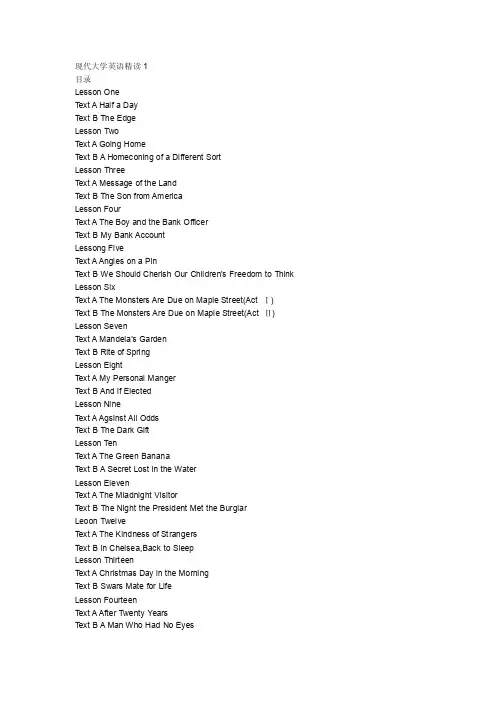
现代大学英语精读1目录Lesson OneT ext A Half a DayT ext B The EdgeLesson TwoT ext A Going HomeT ext B A Homeconing of a Different SortLesson ThreeT ext A Message of the LandT ext B The Son from AmericaLesson FourT ext A The Boy and the Bank OfficerT ext B My Bank AccountLessong FiveT ext A Angles on a PinT ext B We Should Cherish Our Children's Freedom to Think Lesson SixT ext A The Monsters Are Due on Maple Street(Act Ⅰ)T ext B The Monsters Are Due on Maple Street(Act Ⅱ) Lesson SevenT ext A Mandela's GardenT ext B Rite of SpringLesson EightT ext A My Personal MangerT ext B And If ElectedLesson NineT ext A Agsinst All OddsT ext B The Dark GiftLesson TenT ext A The Green BananaT ext B A Secret Lost in the WaterLesson ElevenT ext A The Miadnight VisitorT ext B The Night the President Met the BurglarLeoon TwelveT ext A The Kindness of StrangersT ext B In Chelsea,Back to SleepLesson ThirteenT ext A Christmas Day in the MorningT ext B Swars Mate for LifeLesson FourteenT ext A After Twenty YearsT ext B A Man Who Had No EyesLesson FifteenT ext A T ouched by the MoonT ext B A Plea for Our Planet~~~~~~~~~~~~~~~~~~~~~~~~~~~~~~~~~~~~~~~~~~~~~~~~~~~~~ 现代大学英语精读2目录Lesson One Another School Year-What For?Lesson Two Mahegun My BrotherLesson Three More Crime and Less PunishmentLesson Four The Nightingale and the RoseLesson Six The Man in The WaterLesson Seven The Greatest InventionLesson Eight Paychologically SpeakingLesson Ten The Richer,the PoorerLesson Eleven You Have to Get Me Out of HereLesson Twelve Confessions of a Miseducated ManLesson Fourteen Space Shuttle ChallengerLesson Fifteen The Riddle of Time~~~~~~~~~~~~~~~~~~~~~~~~~~~~~~~~~~~~~~~~~~~~~~~~~~~~~ 现代大学英语精读3目录Plan of the BookAcknowledgementT extsLesson OneT ext A Your College YearsT ext B Preparing for CollegeLesson TwoT ext A Discovery of a FatherT ext B The Last Word Was LoveLesson ThreeT ext A Michael Dell’s Two-Billion-Dollar DreamT ext B Would You Know a Computer If You Met One?Lesson FourT ext A Wisdom of Bear WoodT ext B Baby BirdsLesson FiveT ext A Twelve Angry Men (Part One)T ext B Shot Actress — Full Story (Part I)Lesson SixT ext A Twelve Angry Men (Part T wo)T ext B Shot Actress — Full Story (Part I)Lesson SevenT ext A The RivalsT ext B The Open WindowLesson EightT ext A "We’re Only Human"T ext B Button, ButtonLesson NineT ext A A Dill PickleT ext B The Valentine GenerationLesson TenT ext A Diogenes and AlexanderT ext B A Horseman in the SkyLesson ElevenT ext A Silent SpringT ext B Of Man and the Stream of TimeLesson TwelveT ext A The Needs that Drive Us AllT ext B Maslow’s Hierarchy of NeedsLesson ThirteenT ext A In My DayT ext B My Grandmother, the Bag LadyLesson FourteenT ext A Mercy at AppomattoxT ext B Grant and Lee: A Study in ContrastsLesson FifteenT ext A The President as Corporate SalesmanT ext B Our Leaders Don’t Know BestVocabulary ListIdiomatic Expressions and Collocations~~~~~~~~~~~~~~~~~~~~~~~~~~~~~~~~~~~~~~~~~~~~~~~~~~~~~ 现代大学英语精读4目录Plan of the BookAcknowledgementT extLesson OneT ext A Thinking as a HobbyT ext B The Pleasures of LearningLesson TwoT ext A Waiting for the PoliceT ext B The Hitch—hikerLesson ThreeT ext A Why Historians DisagreeT ext B The Third ManLesson FourT ext A A Drink in the PassageT ext B The BenchLesson FiveT ext A Man of the MomentT ext B Climbing the Mountain of SuccessLesson SixT ext A Groundless BeliefsT ext B Corn——pone OpinionsLesson SevenT ext A Spring SowingT ext B The Earth POetLesson EightT ext A Globalization’S Dual PowerT ext B The International Language of GesturesLesson Nine。
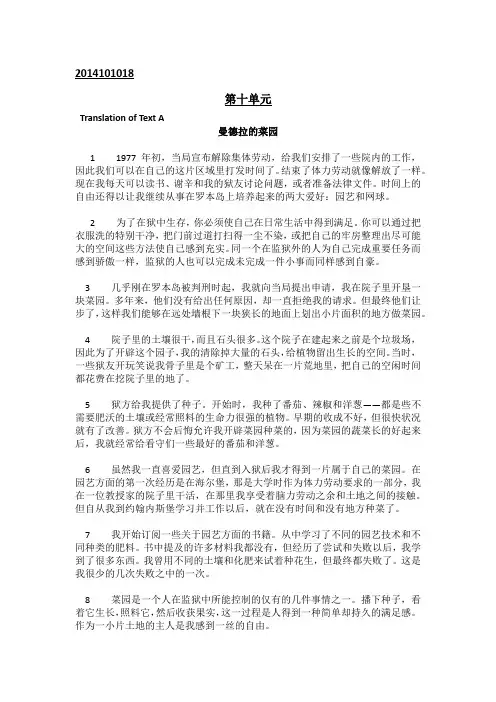
2014101018第十单元Translation of Text A曼德拉的菜园1 1977年初,当局宣布解除集体劳动,给我们安排了一些院内的工作,因此我们可以在自己的这片区域里打发时间了。
结束了体力劳动就像解放了一样。
现在我每天可以读书、谢辛和我的狱友讨论问题,或者准备法律文件。
时间上的自由还得以让我继续从事在罗本岛上培养起来的两大爱好:园艺和网球。
2 为了在狱中生存,你必须使自己在日常生活中得到满足。
你可以通过把衣服洗的特别干净,把门前过道打扫得一尘不染,或把自己的牢房整理出尽可能大的空间这些方法使自己感到充实。
同一个在监狱外的人为自己完成重要任务而感到骄傲一样,监狱的人也可以完成未完成一件小事而同样感到自豪。
3 几乎刚在罗本岛被判刑时起,我就向当局提出申请,我在院子里开垦一块菜园。
多年来,他们没有给出任何原因,却一直拒绝我的请求。
但最终他们让步了,这样我们能够在远处墙根下一块狭长的地面上划出小片面积的地方做菜园。
4 院子里的土壤很干,而且石头很多。
这个院子在建起来之前是个垃圾场,因此为了开辟这个园子,我的清除掉大量的石头,给植物留出生长的空间。
当时,一些狱友开玩笑说我骨子里是个矿工,整天呆在一片荒地里,把自己的空闲时间都花费在挖院子里的地了。
5 狱方给我提供了种子。
开始时,我种了番茄、辣椒和洋葱——都是些不需要肥沃的土壤或经常照料的生命力很强的植物。
早期的收成不好,但很快状况就有了改善。
狱方不会后悔允许我开辟菜园种菜的,因为菜园的蔬菜长的好起来后,我就经常给看守们一些最好的番茄和洋葱。
6 虽然我一直喜爱园艺,但直到入狱后我才得到一片属于自己的菜园。
在园艺方面的第一次经历是在海尔堡,那是大学时作为体力劳动要求的一部分,我在一位教授家的院子里干活,在那里我享受着脑力劳动之余和土地之间的接触。
但自从我到约翰内斯堡学习并工作以后,就在没有时间和没有地方种菜了。
7 我开始订阅一些关于园艺方面的书籍。
现代大学英语精读1课本内容及翻译Lesson One Half a DayNaguib Mahfous1. I walked alongside my father, clutching his right hand. All my clothes were new: the black shoes, the green school uniform, and the red cap. They did not make me happy, however, as this was the day I was to be thrown into school for the first time.2. My mother stood at the window watching our progress, and I turned towards her from time to time, hoping she would help.We walked along a street lined with gardens, and fields planted with crops: pears, and date palms.3. "Why school ?" I asked my father. "What have I done ?"4. "I'm not punishing you, " he said, laughing. "School's nota punishment. It's a place that makes useful men out of boys.Don' t you want to be useful like your brothers?"5. I was not convinced. I did not believe there was really any good to be had in tearing me away from my home and throwing me into the huge, high-walled building.6. When we arrived at the gate we could see the courtyard, vast and full of boys and girls. "Go in by yourself, " said my father, "and join them. Put a smile on your face and be a good example to others. "7. I hesitated and clung to his hand, but he gently pushed me from him. "Be a man, " he said. "Today you truly begin life.You will find me waiting for you when it's time to leave. "8. I took a few steps. Then the faces of the boys and girls came into view. I did not know a single one of them, and none of them knew me. I felt I was a stranger who had lost his way.But then some boys began to glance at me in curiosity, and one of them came over and asked, "Who brought you?"9. "My father, " I whispered.10. "My father's dead, " he said simply.11. I did not know what to say. The gate was now closed. Some of the children burst into tears. The bell rang. A lady came along, followed by a group of men. The men began sorting us into ranks. We were formed into an intricate pattern in the great courtyard surrounded by high buildings; from each floor we were overlooked by a long balcony roofed in wood.12. "This is your new home, "said the woman. "There are mothers and fathers here, too. Everything that is enjoyable and beneficial is here. So dry your tears and face life joyfully. "13. Well, it seemed that my misgivings had had no basis. From the first moments I made many friends and fell in love with many girls. I had never imagined school would have this rich variety of experiences.14. We played all sorts of games. In the music room we sang our first songs. We also had our first introduction to language.We saw a globe of the Earth, which revolved and showed the various continents and countries. We started learning numbers, and we were told the story of the Creator of the universe. We ate delicious food, took a little nap, and woke up to go on with friendship and love, playing and learning.15. Our path, however, was not totally sweet and unclouded. We had to be observant and patient. It was not all a matter of playing and fooling around. Rivalries could bring about pain and hatred or give rise to fighting. And while the lady would sometimes smile, she would often yell and scold. Even more frequently she would resort to physical punishment.16. In addition, the time for changing one' s mind was over and gone and there was no question of ever returning to the paradise of home. Nothing lay ahead of us but exertion, struggle, and perseverance. Those who were able took advantage of the opportunities for success and happiness that presented themselves.17. The bell rang, announcing the passing of the day and the end of work. The children rushed toward the gate, which was opened again. I said goodbye to friends and sweethearts and passed through the gate. I looked around but found no trace of my father, who had promised to be there. I stepped aside to wait. When I had waited for a long time in vain, I decided to return home on my own. I walked a few steps, then came to a startled halt. Good Lord! Where was the street lined with gardens? Where had it disappeared to? When did all these cars invade it? And when did all these people come to rest on its surface? How did these hills of rubbish find their way to cover its sides? And where were the fields that bordered it? High buildings had taken over, the street was full of children, and disturbing noises shook the air. Here and there stood conjurers showing off their tricks or making snakes appear from baskets. Then there was a band announcing the opening of a circus, with clowns and weight lifters walking in front.18. Good God! I was in a daze. My head spun. I almost went crazy. How could all this have happened in half a day, between early morning and sunset? I would find the answer at home with my father. But where was my home? I hurried towards the crossroads, because I remembered that I had to cross the street to reach our house, but the stream of cars would not let up.Extremely irritated, I wondered when I would be able to cross.19. I stood there a long time, until the young boy employed at the ironing shop on the corner came up to me.20. He stretched out his arm and said, "Grandpa, let me take you across."第一课半日1我走在父亲的一侧,牢牢地抓着他的右手。
课文翻译(Unit1——10)第一单元Translation of Text A半日1我走在父亲的一侧,牢牢地抓着他的右手。
我身上穿的,戴的全是新的:黑鞋子,绿校服,红帽子。
然儿我一点儿也高兴不起来,因为今天我将第一次被扔到学校里去。
2母亲站在窗前望着我们缓缓前行,我也不时的回头看她,希望她会救我。
我们沿着街道走着,街道两旁是花园和田野,田野里栽满了梨树和椰枣树。
3“我为什么要去上学?”我问父亲,“是我做错了什么了吗?”4“我不是在惩罚你,”父亲笑着说道,“上学不是一种惩罚。
学校是把孩子培养成才的地方。
难道你不想象你哥哥们那样,成为一个有用的人吗?”5我不相信他的话。
我才不相信把我从家里拽出来,扔进那个大大的,高墙围绕的建筑里对我有什么真正的好处呢。
6到了学校门口,我们看到了宽阔的庭院,站满了孩子。
“自己进去吧,”我父亲说,“加入他们。
笑一笑,给其他的孩子做个好榜样。
”7我紧抓着父亲的手,犹豫不决。
但是父亲却把我轻轻地推开了。
“拿出点男子气概来,”他说,“从今天起你就要真正开始自己的生活了。
放学时我会在这等你的。
”8我走了几步,便看见了一些孩子的面孔。
他们中我一个也不认识。
他们也没有一个认识我的。
我感觉自己像是一个迷了路的陌生人。
然而这时有些男孩开始好奇的打量我,其中一个走过来问到,“谁带你来的?”9“我爸爸”我小声说道。
10“我爸爸死了,”他简短地说。
11我不知道该说些什么。
这时学校的门已经关上了,有些孩子哭了起来。
接着,铃响了,一位女士走了过来,后面跟着一群男人。
那些人把我们排成几行。
使我们形成一个错综复杂的队行,站在那四周高楼耸立的院子里。
每层楼都有长长的阳台,阳台上带有木制顶棚,从阳台上可以俯视到我们。
12“这是你们的新家,”那位女士说道,“这儿有你们的父母。
一切能带给你们快乐,对你们有益的事物,这儿都有。
因此擦干你们的眼泪,快快乐乐地面对生活。
”13这样看来我之前的顾虑都是毫无根据的了。
PREVIEW1. DDDBVOCABULARY1. Come familiar with the rums of word formation.Give the corresponding nouns for the following verbs.1. improvement 7. cultivation2. endurance 8. nourishment3. success 9. fulfillment4. allowance 10. attempt5. supply 11. elimination6. provision 12. refusal2 Give the corresponding verbs for the following nouns.I, garden 6. fail2. fertilize 7. endure3. mix 8. alternate4. liberate 9, result5. require 10, satisfy3 Translate the following expressions. Point out which -ing form is a gerund and whicha present participle,1, (gerund) 14. (present participle)2. (present participle) 15. (gerund)3.- (present participle) 16. (gerund)4. (gerund) 17. (present participle)5.--~ (gerund) lg. (present participle)6. ,~:~ (present participle) 19. (present participle)7.~_ (gerund) 20. -(gerund)g. ~, _ (present participle) 21. "~~ ~ (gerund)9. ~ ~ (gerund) 22, ~ (present participle)10, ~_ (present participle) 23. (gerund)1 l. ~ ~< (gerund) 24. (present participle )12. ~5~t~ (present participle) 25. -+t~ ~: (present participle)13.~I~,/~ (gerund) 26. (present participle)4 Compare the following expressions and translate them into Chinese.2. Complete the following verb ~ noun collocations or expressions.1. have/get/show/produce/achieve2. have/take/accept/show/bear/assume3, discuss/debate/raise/settle/confuse/ovoid4. pursue/have/develop5. have/make/avoid6. face/lives/time/money/trouble7. roots/chairs/hats/coats/gloves/shoes/bandages/make-up/doubts8. land9. enemies/rivals/opponents/suspects/errors10. oil/cars/cotton/results/a movie11. ear e/time/money/experience/patience/c outage12. the dead/treasure/past/head13. plant s/children/animals/relationship14. meetings/appointments/time/place/books/flowers/business affairs3. Fill in the blanks with the correct form of the expressions listed below. Some ofthem can be used more than once.1. cut out, remove/cut out, from 6. take pride in, through trial and error2. provides/supplies, with 7. read, into3, brought back 8, at great length, providing, with4. ask, permission 9. in some ways, at heart5. empty of4 Fill in the blanks with the correct prepositions or adverbs.1. in 6. up2. up 7. out3. away~ 8.up4. way 9. with5. out5 Translate the following sentences into English.I. If they refused to give back these small islands, the two countries would not be able tonormalize their diplomatic relations completely.2. I know that it is stupid to give up this opportunity, but I have no other choice/alternative.3. For lack of public support, the White House had to give in al last.4, It may not be possible to eliminate drags all at once/immediately/at one go, but now there are millions of people throughout the world who succeed in kicking the habit of cigarettesmoking every year.5. We have already made contact with the representatives of file other side and arranged tomeet in Xiamen before long to discuss important issues we are both interested in.6. One day, that new building suddenly gave way/collapsed/fell down, burying many peopleunder it.7. Love requires nourishment from both sides, and true love is in the giving, not in thetaking.8. As soon as Grandma's health improved, she began to give out her belongings to her folksand friends.9. It requires perfect honesty on both sides to cultivate a lasting/an enduring friendlyrelationship.10. It is announced that our economic plan tiffs year has been fulfilled and our domestic/homemarket bas also been flourishing.6. Rewrite the following sentences, replacing the phrases in bold type with words andexpressions from the text.1. the prison authorities informed us/announced, manual labor would end, arrange2. pursue my two favorite hobbies3, if you want to survive the prison, try to develop ways to take satisfaction4: fulfilled5. asked them for permission to, refused, offering a reason6. a miner at heart7. provided/supplied me with seeds, regret giving me permission to, once, garden began toflourish, provided, warders with8. not until I was behind bars, tend9. at great length, what she read into10. hardy plants, My favorite7. Translate the following sentences, paying attention to the words in bold type whichmay have different meanings in different contexts.1缺水已经成了个尢问题。
现代大学英语精读1课后答案现代大学英语精读1课后答案目录Lesson1HalfaDay 12、Lesson2GoingHome 33、Lesson3MassageoftheLand 44、Lesson4TheBoyandtheBankOfficer 65、Lesson5AngelsonaPin 76、Lesson6TheMonstersAreDueonMapleStreet 87、Lesson7Mandela’sGarden 108、Lesson8MyPersonalManager 111、Lesson1HalfaDayAnswers1.OralWork1)Whatdidhisfathersaytogivehimcourage?Howdidtheboyfee lwhenhearrivedattheschoolgatewithhisfather?2)Whatdidtheboylearninschool?Canyounamesomeofthethin gshelearned?2.Vocabularytest1)choosetherightwordandputintheproperform:(1)hadreceived(2)affects(3)Admission(4)awake(5)beneath(6)on2)Putinthemissingwords.good-natured;hunt;drank;queer;asleep;woke;occurred;absence;portrait;replace.3.GrammarWorkPutintheblankswithcorrectverbforms.(1)wassurfingwascut;(2)willhaveplanted;(3)was;hadnotbeen;(4)hasbeenmarried;(5)is;willbe;(6)is;musthaverained4.WrittenWorkWritewhatyou’velearntfromthetextaboutthelittleboy’slifei nschoolinabout100words.5.Translation(1)也许所有教育最有价值的结果就是培养你有具有让你完成你不得不做的任何该做的事,不管你愿不愿意做.(2)教育就是能让我们不断地发现我们的无知.Lesson2GoingHomeAnswers1.Oralwork(1)Whatdoyouknowabouttheseyoungpeople?(2)Howdidtheyoungpeoplefeelwhentheyheardthestory?2.Vocabularytest1)choosetherightwordandputintheproperform:(1)across(2)rise(3)attend/takepartin(4)reach(5)since(6)above/below2)Putinthemissingwords.screaming;clenched;triumph;exaltation;except;stunned;misty;covered;ribbons;banner3.GrammarworkTranslation.(1)Nobodycouldtellwherethetreasurewashidden.(2)Thetrafficwillbeveryheavyontheroadduringtherushhourev eryday.(3)Hemayhavegivenheradvice,butIdoubtifitdoesheranygood.(4)Whatshelearnedatuniversityprovedusefulinherresearch.(5)Ifhehadwaitedforthetrafficlightstochange,hewouldnothav ebeenkilled.(6)IfnotIhadseenhimatthepartyyesterdayevening!4.WrittenWork略.5.Translation(1)多给人原谅比多去谴责(2)如果我们想要去爱,我们必须学会如何去原谅.Lesson3MassageoftheLandAnswers1.Oralwork(answersomitted)2.Vocabularytest(1)unfaithful(2)takeout(3)talkover(4)sendfor(5)sentaway(6)sendup2)Putthemissingwords(1)sick/ill(2)alone(3)out(4)phone(5)on(6)until(7)church(8)only(9)answered(10)needed (11)clever(12)save(13)bit(14)now3)Writethenumbersinwords.(1)Twohundredandeight(2)Onethousandfivehundred/fifteenhundred(3)Seventhousand,onehundredandtwenty-eight.(4)twodollarssix-five/twodollarsandsixty-fivecents.(5)fourth(6)twenty-first(7)thirtieth(8)onehalf,threequarters,fourfifths3.Grammarwork(answersomitted)4.WrittenWorkOnepossibleversion:Myparentswereborn,broughtupandmarriedonthisland.Theyh avebeenlivingtherethroughtheirlife.Theygotupatsunriseandretire dwiththeirchickens.Theyplantedandreapedriceandraisedafewgoa ts,cowsandchickenswhichcouldprovidewhattheyneededintheirda ilylife..However,thepieceoflandswasnolongerfertile,bleedingyear afteryear,likethem,gettingoldandexhausted.Thesoilwasnotdifficu lttotillwhentherewasalotofrain,butinabadyear,itwasnotonlythepl oughsthatbrokebuttheirhearts,too.Thefarmerlifeishardbutmypar entsareenjoyingit.Theycherishtheirlandandneverwanttoleaveit.5.Translation.1)家再贫寒,也没有任何地方能和它比。
课文翻译(Unit1——10)第一单元Translation of Text A半日1我走在父亲的一侧,牢牢地抓着他的右手。
我身上穿的,戴的全是新的:黑鞋子,绿校服,红帽子。
然儿我一点儿也高兴不起来,因为今天我将第一次被扔到学校里去。
2母亲站在窗前望着我们缓缓前行,我也不时的回头看她,希望她会救我。
我们沿着街道走着,街道两旁是花园和田野,田野里栽满了梨树和椰枣树。
3“我为什么要去上学?”我问父亲,“是我做错了什么了吗?”4“我不是在惩罚你,”父亲笑着说道,“上学不是一种惩罚。
学校是把孩子培养成才的地方。
难道你不想象你哥哥们那样,成为一个有用的人吗?”5我不相信他的话。
我才不相信把我从家里拽出来,扔进那个大大的,高墙围绕的建筑里对我有什么真正的好处呢。
6到了学校门口,我们看到了宽阔的庭院,站满了孩子。
“自己进去吧,”我父亲说,“加入他们。
笑一笑,给其他的孩子做个好榜样。
”7我紧抓着父亲的手,犹豫不决。
但是父亲却把我轻轻地推开了。
“拿出点男子气概来,”他说,“从今天起你就要真正开始自己的生活了。
放学时我会在这等你的。
”8我走了几步,便看见了一些孩子的面孔。
他们中我一个也不认识。
他们也没有一个认识我的。
我感觉自己像是一个迷了路的陌生人。
然而这时有些男孩开始好奇的打量我,其中一个走过来问到,“谁带你来的?”9“我爸爸”我小声说道。
10“我爸爸死了,”他简短地说。
11我不知道该说些什么。
这时学校的门已经关上了,有些孩子哭了起来。
接着,铃响了,一位女士走了过来,后面跟着一群男人。
那些人把我们排成几行。
使我们形成一个错综复杂的队行,站在那四周高楼耸立的院子里。
每层楼都有长长的阳台,阳台上带有木制顶棚,从阳台上可以俯视到我们。
12“这是你们的新家,”那位女士说道,“这儿有你们的父母。
一切能带给你们快乐,对你们有益的事物,这儿都有。
因此擦干你们的眼泪,快快乐乐地面对生活。
”13这样看来我之前的顾虑都是毫无根据的了。